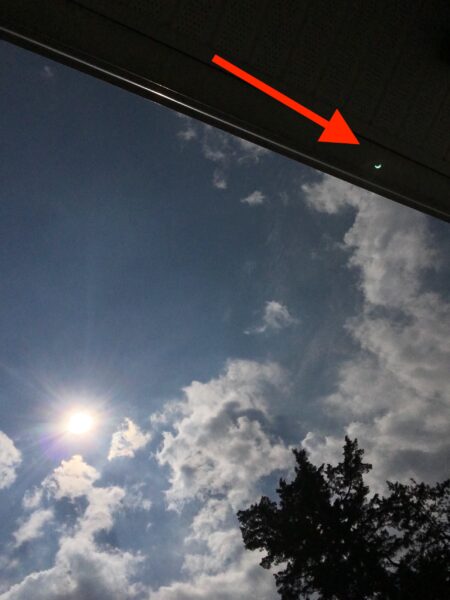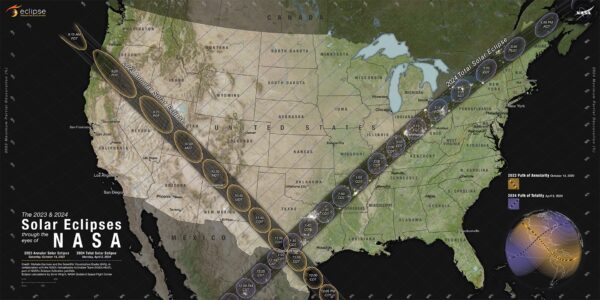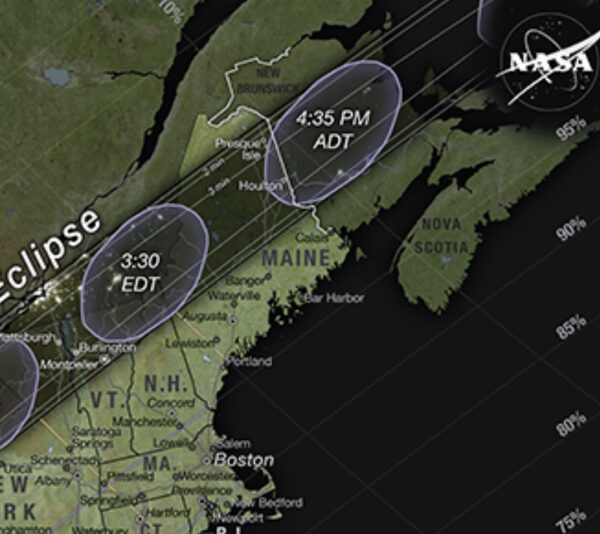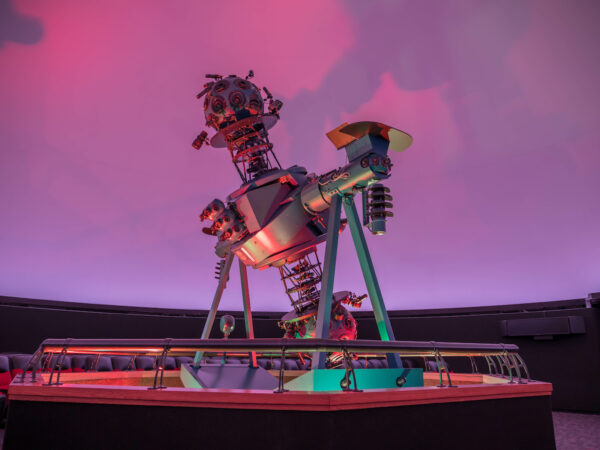Did you know that there will be a total solar eclipse in Maine in 2024?
In fact, it will cross Maine on April 8, 2024.
This is limited to the western portion of Maine, which will be in the path of totality. As in total darkness.
However, Mainers might see a slight darkening of daylight that day.
The total solar eclipse in 2024 starts in Texas and ends its run in America over Northern Maine.
The last time I got to witness a solar eclipse was in August 2017.
I took the picture here (without looking at the sun, of course), and if you look in the top right corner of the image, you can see a reflection of the eclipse happening.

Photo by Leah Ingram
Where to see the 2024 solar eclipse in Maine
As I mentioned, the total solar eclipse will come across Maine on April 8, 2024.
According to NASA, which created the map below, Mainers will be able to witness the solar eclipse starting around 2:20 p.m. Eastern Time.
At around 3:30 p.m. Eastern Time, there will be a total eclipse of the sun.
By around 4:40 p.m., the sun will be back to normal.

Credit: NASA’s Scientific Visualization Studio
I know it’s hard to see in this map exactly where in Maine you will or will not be able to see that 2024 solar eclipse.
So, I found another image from NASA’s Scientific Visualization Studio and did a zoomed-in screenshot that showed some of the cities and towns near or within the solar eclipse zone.

Credit: NASA’s Scientific Visualization Studio
You can see that none of Southern Maine will have good viewing.
Neither will Augusta, Bangor, Calais or Waterville. However, there will be some viewing available but not a total eclipse of the sun.
However, if you can take a day trip from Portland, Maine to Caribou or Houlton or Presque Isle, you should have a great view of the solar eclipse.
What is a solar eclipse
A solar eclipse happens during the day when the moon passes between the sun and the Earth. That may sound like crazy talk, because doesn’t the moon only come out at night? Well, yes. But also no.
There are plenty of days when you can see the moon in the sky during daylight hours. It’s just during the rare solar eclipse when it affects how much sunlight we actually see.
I remember during the last solar eclipse, as it was happening, suddenly all the birds went quiet. I’m sure they were confused about why it was suddenly nighttime. Then, as the eclipse started to pass, the birds started up singing and chattering again.
Maine total eclipse schedule
In fact, according to NASA, here is the eclipse schedule for Caribou, Maine:
- Caribou, Maine
- 2:22 p.m. EDT (partial begins)
- 3:32 p.m. EDT (totality begins)
- 3:33 p.m. EDT (maximum)
- 3:34 p.m. EDT (totality ends)
- 4:40 p.m. EDT (partial ends)
According to the website Great American Eclipse, the following Maine towns are in the totality of the eclipse:
- Ashland
- Bingham
- Caribou
- Dover-Foxcroft
- East Millinocket
- Fort Fairfield
- Greenville
- Howland
- Houlton
- Limestone
- Lincoln
- Mars Hill
- Millinockett
- Presque Isle
Where to stay
If you still haven’t booked lodging in or near the total eclipse, you should probably do that right away. When I looked on VRBO for homes to rent in the path of the eclipse, only 21% of properties in that catchment area still had availability.
It’s going to be a fairly narrow band that goes across Maine during the eclipse. As such I would focus on finding hotels, inns or AirBnB homes in the following counties:
- Oxford County (northern tip)
- Franklin County (northern half)
- Somerset County (midsection)
- Piscataquis County (lower half)
- Penobscot County (center and north)
- Aroostook County aka just The County (panhandle part that includes Houlton and Presque Isle)
Why you don’t look at an eclipse directly
You’ve probably heard it repeatedly that you should not look directly at a solar eclipse. Why? Because you can cause severe eye damage.
In normal circumstances, when you look at a bright object, your pupil closes to protect your eye. However, during a solar eclipse, your pupil may not react properly and you’ll be left staring at the sun. That can cause instant eye damage.
I’ll let the folks from NASA explain it a bit more forcefully:
“Do NOT look at the Sun through a camera lens, telescope, binoculars, or any other optical device while wearing eclipse glasses or using a handheld solar viewer — the concentrated solar rays will burn through the filter and cause serious eye injury.”
NASA
Solar eclipse viewing glasses
NASA recommends that you invest in safe solar viewing glasses — also called eclipse glasses — or a safe handheld solar viewer. Planetariums, like the ones mentioned below, usually sell them in their gift shops.
Here are ways to get solar eclipse glasses now.
Note: Southern Maine on the Cheap is not responsible for the inherent risk you assume in looking at an eclipse. Refer to this list from the American Astronomical Society for manufacturers of solar eclipse-safe glasses. If the maker of your glasses does not appear on this list, do not use them for the eclipse.
Where to learn all about solar eclipses
Before a solar eclipse occurs — or even afterwards, if the topic interests you — you can learn more about this phenomenon as well as other astronomical topics.
For example, there is a planetarium associated with the University of Southern Maine.
That planetarium is in Portland.
Southworth Planetarium

Adobe Photos
The Southworth Planetarium is on the USM Portland Campus at 70 Falmouth Street Portland.
In addition to educational programs about planets, eclipses and more, the Southworth Planetarium offers a different kind of entertainment, too.
For example, recently they held a laser show set to the music of Pink Floyd’s “The Wall.”
I can remember going to this laser show as a teen in the 1980s.
The Planetarium also has shows about dinosaurs for youngsters.
In addition, children’s programming includes information about solar eclipses, like the ones happening in 2023 and 2024.
Visiting the Southworth Planetarium is the perfect rainy day activity in Southern Maine, much like taking your kids bowling is.
Astronomical Society of Northern New England (ASNNE)
The Astronomical Society of Northern New England (ASNNE) is headquartered in Kennebunk, Maine.
There are two ways to participate in ASNNE events.
One, you can attend the monthly meetings, held at The New School on York Street in Kennebunk.
Or, two, you can head outdoors for stargazing at the ASNNE’s Starfield Observatory, also in Kennebunk.
Located in a field off Alewive Road (Route 35), this Observatory has two gigantic telescopes.
Some of the programming includes:
- teaching the basics of how to recognize the constellations
- observing the stars and planets with telescopes of all sizes
- presenting monthly discussions on a wide variety of astronomy-related topics
You can even organize a star-gazing party.
Here is a link to the ASNNE website for more information.
This article can help if you’re interested in seeing the Northern Lights in Maine.
Free and Cheap Things To Do in Southern Maine This Week
Here are FREE and cheap things to do in Southern Maine in the coming week.